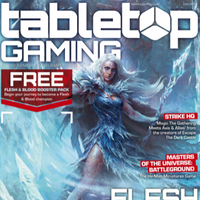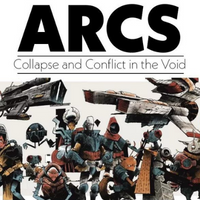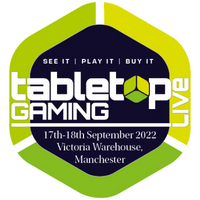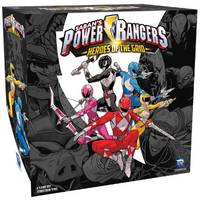27 June 2022
|
This shouty party game classic is nearly 120 years old and deserves a revisit
Words by Christopher John Eggett
If a party game was meant to do anything to a group, it’s to engender electric giddiness, to loosen things up, to reintroduce ‘play’ into your meet-ups. Maybe you spend most of your week being quite serious, and the weekend get-together just needs a little spark to distract you back to being yourself. So before anyone asks how work was, you break out a game – something light, quick, and with the perfect balance of silliness and potential strategy.
While you might think that we’d recommend one of the many very good hobby titles that encourage this kind of thing, you’d be wrong (this month anyway). Instead, we’re suggesting a stone cold classic, first published in 1903, Pit.
WHAT IS IT?
Pit is a game intended to produce something like the feeling of being in the trading floor (said ‘pit’) of a stock market. There you are, shouting to one another, brokering deals as quickly as possible before the information around you changes. In the world of this new information, you’ve got to go straight back out and make another deal – ideally leveraging what you’ve just gained in some way.
While Pit isn’t exactly this feeling, it’s pretty close. Players are dealt a hand of cards, usually eight or nine, depending on the number of players and the version of the game they’re playing. These cards will each display a commodity of some sort – like flax, corn, barley, hay, rye, wheat, and oats as well as a number of points in the corner. And then there’s also the bull and the bear – each of which has a significance to a winner or loser. Players are attempting to collect a full hand of one type of good, and once they do, shouting “pit!” or ringing a bell, depending on what version you have… and if you’ve lost the bell or not.
Once everyone has cards in their hand, the chaos can begin. Players will, simultaneously, take sets of cards they want to trade (some rules stipulate they should be matching cards from the same set, others not), and offer them face down to the table. But they can’t say “here’s three flax, I’d love two barley, cheers.” Instead players can only say how many cards they’re exchanging, and the player that wants to take them up on it must exchange the same number of cards.
The players make the swap, the trade is complete, they look at their cards and, sometimes, swear. Or smirk. See, while it’s a game of collecting together one set of cards in its entirety, it’s also about reading each other and the market. While you might have started out with the goal of being a flax baron, as soon as you notice wheat is being chucked around in the market, you can leap on those easy-to-get exchanges and be halfway to making the complete set.
And these trades, while not quite at the level of automatic and algorithmic trading used by the world’s stock exchanges, are fast. You’re losing out if you’re not back into the mix immediately with an offer for a number of cards.
There is, allegedly, a scoring system in the game and the winner is the first to get to 500 points. The number of points you score once someone has shouted “pit!” or dinged the bell is related to whether you have a complete set, and that number of points multiplied by the number of cards. This entirely doesn’t matter however, unless there’s a society of professional Pit players we’ve yet to encounter. It’s mostly a game where you can make up your winning criteria of a session. Corning the market is fun, but it’s certainly more fun to shuffle and dish out the cards again.
WHY SHOULD YOU PLAY IT?
It gets loud. Seeing your gaming group descend into the nonsense of just shouting “Two! Two! Two!” while proffering cards around the table like the world’s worst salesman is hilarious. As is the moment when that same player, who has not had a bite for the ‘two’ puts the cards back in their hands, grabs another set and starts with “three!” only to find their neighbour has started calling for sets of two. Or, the glory of passing over some cards you don’t want, and know that the person you’re passing them to doesn’t want, and seeing the pure frustration on their face. There are a million moments like these at the heart of Pit.
We could pretend that you get quite clever with your understanding of what everyone is doing – reading one another’s faces when they receive cards can tell you a lot about their goals – but ultimately, it’s a game played from the gut.
Sometimes you’ll be holding cards because you’re certain someone else wants them, or you’ll spot a sudden splash in the market of what feels like a full set (a lot of the game is about getting given cards you’ve had before and don’t want). You might want to chase that – or you might judge it’s already too late, and someone else is pursuing it. All of these choices can only be played out from the gut because you simply don’t have the information you need from the cards that pass through your hand. There’s no way to truly know if a full set is floating about in the centre of the table, or you’ve just watched the same set of cards be passed to your hand and then on to someone else on repeat.
There are plenty of versions of Pit out there – the extremely sun-damaged one featured on this page is from a friend’s childhood games cupboard. Currently Hasbro have a version containing a huge plastic bell to slap with a ‘ding’ with when you corner the market – also seen on this page. This Hasbro version has a lurid toyish feeling to it which we’ve come to quite enjoy, also the bell holds all the cards, which means that at least you’ve got all of the components in one place. Another version of the game can sometimes be known as Billionaire, or Business – which are much less charming. The very orange 1981 edition is maybe the most handsome, although the Parker Brother’s 1904 edition comes with a Chancellor of the Exchequer red box, should you ever get the chance to grab that.
It’s worth adding to your collection for those games night where there’s too many people and not quite enough time. And who knows, it’s quite likely there’s a copy in some relative’s attic too.
Looking for more?

This review came from Tabletop Gaming Magazine, which is home to all of the latest and greatest tabletop goodness. Whether you're a board gamer, card gamer, wargamer, RPG player or all of the above, find your copy here.
Get your magazine hereRead More...

If you want to read more about one of the most hotly anticipated games of the year, check out our interview with Cole Wehrle on ARCS! A new game from the designer of Root and Oath, and we've got all you need to know.
To infinity and beyond
Join us in person

We can't wait for Tabletop Gaming Live 2022! An epic weekend in Manchester full of board games, card games, roleplaying games, wargames and more, with amazing exhibitors, great games, and an opportunity to game together in person.
See you there!Treat Yourself!

Have you visited our game store? We have everything from mystery boxes, to games and accessories – including the above Power Rangers: Heroes of the Grid, with a great discount! Head over to find your new favourite game.
Visit the Game Store
Sometimes we may include links to online retailers, from which we might receive a commission if you make a purchase. Affiliate links do not influence editorial coverage and will only be used when covering relevant products







